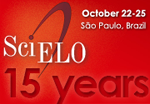Based on Umberto Eco’s book “The Vertigo of Lists”, this blog post recalls the historical origin of lists, discussing their evolution to today’s sophisticated technological artifacts of information organization, and culminating in the emergence of global hierarchical listings showing the positioning of universities, also known as rankings. … Read More →
Integrity in research and the role of the institution: the time has come!
In highlighting the importance of holding the 4th World Conference on Research Integrity in Brazil in 2015, Sonia Vasconcelos emphasizes the recognition that the Global Research Council gives to the relevance of scientific integrity in funding, production and evaluation of research, and sees as possible the support of institutions so that scientific integrity may also become part of the culture of the training of graduate and undergraduate students. … Read More →
Only one month left until the SciELO 15 Years Conference
The program brings together researchers and experts that study and actively participate in the contemporary issues and in the future of editing, publishing, indexing, dissemination and evaluation of academic journals. It also brings together those in public policy, and in products and services that influence the development of journals. … Read More →
Interview with Cicilia K. Peruzzo
With 50 years since the creation of the academic discipline of Communication Science in Brazil, what assessment can be made today of the successes and challenges of the field? Currently there are 64 graduate course in the country, while there were 6 in the 80‘s.The journal Intercom, the first academic journal in Communication in Brazil to be made available in open access, is an exciting editorial project that corresponds to an important part of this process of the development of the field. … Read More →
Interview with Susana I. Córdoba de Torresi
Susana I. Cordoba de Torresi, from the Brazilian Chemical Society discusses the mission, achievements and challenges of the Society’s journals, from having them ranked in the national Qualis system, to how SciELO has improved their visibility. … Read More →
Interview with Vincent Larivière
Bibliometrics/Scientometrics is at the heart of information science and It is important to recall the various limitations of bibliometric indicators – warns Vincent Larivière. The journal Impact Factor provides a useful “holistic” indication of the relative position of a journal within a subfield. Most researchers outside Library and Information Science have no clue on its actual limitations! … Read More →
Indicators of academic productivity in University rankings: criteria and methodologies
The collective academic output of professors, researchers and students affiliated to universities, measured by the number of articles that are published in indexed journals and/or by citations they receive, is one of major indicators used in the elaboration of university rankings. However, each ranking evaluates academic output differently. … Read More →
Altmetrics, Alternative metrics and Alternative measurements: new perspectives on the visibility and impact of scientific research
Altmetrics is a new field which measures the interactions that occur on the Web on the part of users about research results. Sibele Fausto follows up on the post of Atila Iamarino and comments on the repositioning of the invisible colleges in social networks which has resulted in an intensified exchange of information and debate of ideas, whose metrics point to the interest stimulated by scientific works. … Read More →
You do the sharing, I “like” it and we create the metrics
The approach instinctively adopted by users of social networks to share articles leaves trails which are tracked almost immediately by metrics which give some indication of their future value as an information source. This is in complete contrast to citation based metrics which can take months or even years to be calculated. Atila Iamarino speaks to us about “The Wisdom of Crowds” as it takes place in real time. … Read More →
Conference Agenda: SciELO 15 Years Conference
The SciELO 15 Years Conference will deal with the dimensions and aspects of contemporary scholarly communication that are molding the form and ways that academic research will be communicated in the future. The conference program attempts to place the analyses and debates within the framework of a global vision of academic research. … Read More →
Interview with Hooman Momen, Editor of the Bulletin of the World Health Organization
The editor of the WHO Bulletin talks about the various trends permeating international Open Access scholarly communication, the Finch report (UK), megajournals, multilingualism, and the transformative impact of technologies that always bring out conditions that favor or challenge the development of journals of developing countries or emerging economies, in particular those of SciELO. … Read More →
Paper proposes four pillars for scholarly communication to favor the speed and the quality of science
The authors identify four converging cornerstones for advancing the process of communicating academic research: enhancing products and formats of scholarly communication; immediate publication in Open Access; open peer review; and broad public recognition of the process of communication, of the corresponding products and of the academics involved. … Read More →
SciELO – the first 15 years: towards a New Era
The SciELO in Perspective blog makes its debut with the aim of promoting the exchange of information, experiences and knowledge in scholarly communication. The intention is to share the advances of the SciELO Program and Network in their new development phase. Your collaboration is welcomed. … Read More →
Apart of SciELO, FAPESP promotes new initiatives in open access
The Scientific Director of the São Paulo Research Foundation (FAPESP), Carlos Henrique Brito Cruz, highlights the advances of the SciELO Program and announces the creation of institutional repositories at the University of the State of São Paulo to hold open access articles from research funded by FAPESP. He also announces a call for proposals in coordination with other Brazilian funding agencies to professionalize selected national journals. … Read More →

























Recent Comments